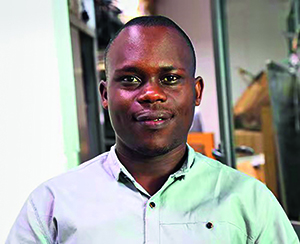|
||||||||||
| Home Top News Economy/Tech Culture/Sports China in Foreign Eyes Green Development Videos Intangible Cultural Heritages |
|
||||||||||
| Home Top News Economy/Tech Culture/Sports China in Foreign Eyes Green Development Videos Intangible Cultural Heritages |
| ChinAfrica |
| Double Take | Pursuing a Higher University Degree |
| The Double Take column looks at a single topic from both African and Chinese perspectives. This month, we discuss whether it is wise for everyone to pursue a higher educational degree. |
| VOL. 17 January 2025 ·2025-01-07 |

Debate over the value of higher education has resurfaced in China, as the number of students registering for postgraduate entrance exams declined for the second consecutive year. Experts argue that pursuing advanced degrees is no longer as cost-effective as it once was. So, should we continue chasing higher levels of education?

It’s a Means to an End, Not an End in Itself
Zhang Qiyue
An 18-year-old Chinese college student
In today’s increasingly competitive environment in China, finding a job - let alone a desirable one - has become more challenging for college graduates. As a result, many young people opt for higher education, hoping it will open more opportunities and provide temporary relief from life’s challenges.
From my perspective, the necessity of a higher degree is not universal. It is a personal choice that varies based on individual goals. A bachelor’s, master’s, or doctoral degree is not essential for everyone because people define success and fulfilment differently. For those who just want to find a means of livelihood, a university degree may not be necessary, as there are alternative paths to achieving that goal.
Higher education should be guided by personal and professional aspirations, not merely the desire to “climb higher.” It is important to carefully consider the opportunity costs, the potential return on investment, and, most importantly, one’s genuine passion for further academic exploration.
The “rat race” for higher educational levels we have been witnessing in China is far from ideal, especially considering the struggles many graduates face and the vast resources often spent with little purpose. The decline in postgraduate enrolment reflects a positive shift: more people are rethinking whether higher education aligns with their needs and goals.
I’ve often heard stories of individuals who were admitted to top universities but chose to drop out after years of struggle. Ultimately, higher education should serve as a means to an end, not an end in itself. Not everyone is suited for - or can afford - the pursuit of advanced degrees, and that’s okay. What matters most is staying true to oneself and following a path that aligns with one’s unique qualities and goals.

It Will Always Remain Irreplaceable
Jean d’Amour Mbonyinshuti
A 38-year-old Rwandan media and communications professional
The value of higher education, especially beyond a bachelor’s degree, is increasingly debated in today’s fast-changing world. Many argue that informal skills, such as those learnt through self-teaching or practical experience, are just as valuable as formal qualifications.
While I acknowledge the importance of these skills, I firmly believe that formal academic training - whether a master’s degree or even a Ph.D. - remains essential, particularly in fields like journalism, social sciences, and business.
When I enrolled for a master’s programme in Journalism and Mass Communication two years ago, some of my peers questioned my decision. In my country, journalism doesn’t require a formal degree, and many argue that a basic understanding of the field is enough.
Despite this, I chose to continue my studies because I believe that formal education provides far more than just technical skills. A university degree doesn’t just teach you what to do - it teaches you how to think critically, analyse complex problems, and navigate real-world challenges.
For instance, in journalism, anyone can start an online blog or news platform, but there is a crucial difference between producing content and understanding the ethics, media law, and responsibility that come with it.
In business, hiring individuals without formal qualifications may save money initially, but it risks limiting productivity and missing strategic insights. Qualified employees with formal training can handle complex decision-making, mitigate risks, and contribute in ways that those without a degree simply cannot.
In my own experience, pursuing a master’s degree has been transformative. It has not only deepened my knowledge but also sharpened my ability to think critically, solve complex problems, and lead effectively. I believe that higher education, when combined with practical experience, offers the best path to long-term success and meaningful contribution to society.
| About Us | Contact Us | Advertise with Us | Subscribe |
| Copyright Beijing Review All rights reserved 京ICP备08005356号-5 京公网安备110102005860号 |